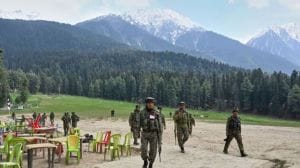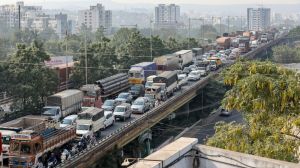The reconstituted Group of Ministers (GoM) on rate rationalisation under the Goods and Services Tax (GST) regime met for the first time on Thursday and broadly agreed to not make any changes with the existing slabs in the indirect tax regime. State finance ministers, who participated in the meeting, also said that the issue of reduction of GST rate in health and life insurance premiums was raised in the meeting of the GoM and it is being reviewed by the fitment committee.
GoM members have sought more data on various items after which it will make a detailed presentation on rate rationalisation proposals at the GST Council meeting slated for September 9. The GoM will then meet again in September-end, state finance ministers said. Bihar’s Deputy Chief Minister Samrat Chaudhary, who is the convenor of the GoM on rate rationalisation said some members of the GoM were not in favour of any tweaks in the existing tax slabs under GST. “All matters were discussed. We will have further discussions. For now, every member has given their views. Some are demanding that there should be no changes in tax slabs under GST. More discussions will happen and then only a final decision will be taken,” he said.

On reducing GST on insurance, Chaudhary said there have been deliberations on it but no decision has been taken. Chaudhary said he has received representations from some associations such as beverages, online gaming, and they will review those and some will be sent to the fitment committee.
Other members of the GoM also supported the view of no change in GST slabs as of now. West Bengal’s Finance Minister Chandrima Bhattacharya said she was of the view that there should be no changes in the GST slabs. “That (changes in GST slabs) will not happen for now. Slabs will be retained at 5, 12, 18, and 28 per cent. This view will be reviewed by the Council now,” she said. When asked if there would be a rate cut, she said: “we have only discussed but no finality (is there).”
Karnataka’s Revenue Minister Krishna Byre Gowda also emphasised on no need for a tweak in the tax slabs under GST, stating that it has broadly stabilised. “It (GST rate structure) has stabilised. So why disturb it…what do you achieve by disturbing it. We said in the next meeting we will discuss it (reducing slabs),” he said.
Gowda said the GoM had asked for a detailed breakup of data for some items, the implication on rates going up or down on those items and accordingly a decision will be taken.
Any such recommendation of tweaks in rates or tax slabs by the GoM would require final approval of the GST Council. Other members of the GoM include Uttar Pradesh Finance Minister Suresh Kumar Khanna, Goa Transport Minister Mauvin Godinho, Rajasthan Medical and Health Services Minister Gajendra Singh along with West Bengal Finance Minister Chandrima Bhattacharya, Karnataka Revenue Minister Krishna Byre Gowda, and Kerala Finance Minister K N Balagopal.
Story continues below this ad
In its previous meeting in June, Sitharaman had said in the next meeting of the GST Council, the GoM on rate rationalisation under Bihar Deputy Chief Minister, will give a presentation on the status of the work and aspects covered by the panel and work pending before the panel.
The GST has five key tax slabs: zero, 5 per cent, 12 per cent, 18 per cent and 28 per cent. A compensation cess, ranging between 1 per cent to 290 per cent, is levied on demerit and luxury goods over and above the topmost rate of 28 per cent. A merger of 5 per cent and 12 per cent slabs or 12 per cent and 18 per cent slabs has been deliberated upon earlier as well but has not been taken up formally for a decision.
West Bengal’s Finance Minister Bhattacharya also raised the issue of reduction in GST rate in health and life insurance premium, adding that it will be reviewed by the fitment committee.
Byre Gowda said the discussion on reducing GST on insurance was discussed in passing but it’s not clear if the decision on it should be taken by the GoM or the Council in its meeting.
Story continues below this ad
Opposition leaders including Leader of Opposition in Lok Sabha Rahul Gandhi, Trinamool Congress chief Mamata Banerjee have demanded withdrawal of GST on life and health insurance premiums. Banerjee had also written a letter to Sitharaman for rollback of GST on life insurance and health insurance premiums. Earlier on July 28, Union Minister of Road Transport and Highways Nitin Gadkari wrote to Sitharaman, saying GST on life and medical insurance premiums amounted to taxing the “uncertainties of life”. Sitharaman had earlier this month said that tax was levied on insurance premiums even before the imposition of GST and that GST revenues are shared between states and the Centre.
The GST Council in its 45th meeting held in September 2021 at Lucknow had deliberated upon the revenue situation, after which a GoM was constituted under the then Karnataka Chief Minister Basavaraj Bommai to examine rate rationalisation. The committee had submitted an interim report in June 2022 suggesting changes in rates for some goods and services along with correction of inverted duty structure.
The concern of maintaining revenue neutrality has weighed on such discussions of rate changes earlier. Revenue neutrality is seen as a crucial factor as a study by the RBI had earlier shown that while the Chief Economic Advisor’s report had pegged the revenue neutral rate at 15.3 per cent, the weighted average GST rate stood at 14.4 per cent in May 2017, and subsequently dropped to 11.6 per cent by September 2019.

































